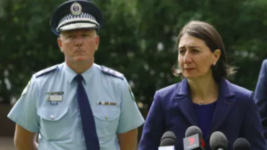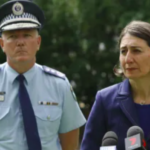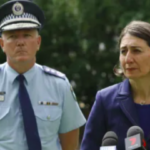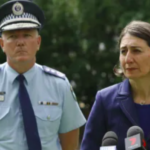NSW Police Commissioner Gets Another Pay Rise

New South Wales Police Commissioner, Mick Fuller, has been granted another pay rise, at the same time thousands of residents, workers and businesses are in financial dire straits.
Mr Fuller’s salary will be increased by a further 2.5 percent – or $16,250.00 – despite the state government implementing a controversial 12-month wage freeze just last year for all public sector employees – including frontline workers such as nurses and paramedics.
Salary higher than the PM
When combined with the $87,000 increase he was granted in 2020, Mr Fuller’s salary will come to $665,750 per year, which is more than the Australian Prime Minister and even the United States President.
Mr Fuller is set to retire next year, and many wonder whether the pay rise is justified in the present situation, especially given the legacy he has left behind.
Performance
Since being in the top job, and putting the COVID-19 pandemic aside, there has been no significant improvement in any of the issues facing our state – in fact, many believe the situation has become worse.
A toxic culture continues to pervade the New South Wales Police Force, with police brutality and aggressive altercations with the general public commonplace.
The culture of bullying, sexism and homophobia and racism within the force also continues, along with the lack of police accountability.
The number of strip searches has skyrocketed during the tenure of Mr Fuller, who was heavily criticised for defending officers who perform illegal strip searches, including unlawful searches against children and young women in public.
More recently, the Commissioner has made clear to the state’s police officers that they will not be held accountable for ‘getting it wrong’ when it comes to COVID fines and arrests, and to focus on enforcement rather than any semblance of community policing.
COVID response
In April 2020, the New South Wales government conferred upon Mr Fuller a range of emergency powers ostensibly to deal with the COVID-19 pandemic.
And just weeks ago, Premier Gladys Berejiklian called on the police force to formulate the very Public Health Orders they are called upon to enforce, and to present these orders to the emergency cabinet for approval.
The police-drafted orders were indeed approved, calling into question whether the restrictions and penalties are based on health advice, rather than on conferring ever-increasing authority on police.
The move also raised concerns about the separation of powers in our state, specifically whether New South Wales can now be considered a ‘police state’ – one which, in practical terms, is being run by law enforcement authorities rather than elected officials.
Heavy-handed policing has become especially pronounced in the poorer suburbs of Sydney, with the police force criticised for differential policing – with the affluent Eastern and Northern suburbs not being subjected to nearly the level of police presence as the less affluent Western and South Western suburbs.
Under Mr Fuller’s tenure, a significant portion of the public has lost respect for an institution they once supported, due partly to the ‘us versus them’-style policies and procedures implemented and fostered by the top brass.
New South Wales in disarray
Across the state, businesses are closing down in high numbers. Thousands have lost their jobs. Families and loved ones are separated.
Young people are falling behind educational standards and have lost hope for the future. Domestic violence victims are at higher risk, mental health issues are increasing – and the list goes on.
The economic cost of Sydney’s lockdown is estimated to be about $1 billion per week.
Heavy-handed COVID policing
The police pandemic response has been heavily criticised since the beginning for being heavy-handed and inconsistent and for disproportionately affecting the most vulnerable members of our community.
More than 1,000 infringement notices have been handed out since fines were increased across New South Wales several days ago.
Thirty-five relate to a church gathering in Blacktown, most of the others are related to weekend rallies in Sydney, protesting against lockdowns and mandatory vaccinations.
Many have questioned the Berejiklian Government’s faith in letting the police manage the pandemic given that it’s a health crisis. Recently police were given the go-ahead to redraft the public health rules to tighten “restriction of movement” in the wake of increased case numbers of Delta.
In doing so, police further clamped down on outdoor exercise and gatherings, despite the fact that there is little evidence to suggest that outdoor transmission is a significant risk.
In answering a question posed by a journalist on this particular subject during a weekend press conference, the Premier said police had requested stricter rules on people being outside as an ‘operational issue’.
Growing discontent
There is also a great deal of unease beginning to bubble up over a number of other decisions that have been made by the Berejiklian Government during the pandemic including the State Government’s recent directive to construction workers to get vaccinated.
Policies that dictate “no jab, no job,” are a significant infringement on civil liberties and human rights.
So far in New South Wales, quarantine workers, airport workers, aged care workers and other health workers have been forced to have vaccinations in order to be able to retain their jobs,
Yet, police, who spend every day interacting with people, and in a significant number of instances, particularly those which involve arrests, engage in close physical contact. But so far, police have yet to be given any such mandate from the Government.
While there wasn’t a textbook for our leaders to follow in combating the Covid-19 pandemic, 18-months on, having watched the pandemic unfold in other states and around the world, they seem unable to consider a different approach to what was originally put in place, and completely oblivious to the pain and pressure that ordinary Australians are feeling right now.
And certainly, the authoritarian approach taken by police has created mistrust in authorities at a time when trust and cooperation is what is needed most.
It’s difficult, particularly without any official statement or comment from the NSW Government, to understand what measurable KPIs or other reasons are behind giving the police chief a pay rise, at a time when the state is in such disarray.
And it only adds to the general discontent amongst the general public that these leaders (while remaining on decent salaries, their jobs secure, and their retirement funding guaranteed) are making decisions which they are largely unaccountable for, in spite of the impact of those decisions on ordinary Australians both in the short and long term.






